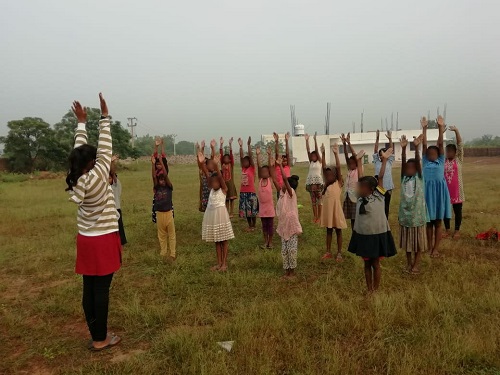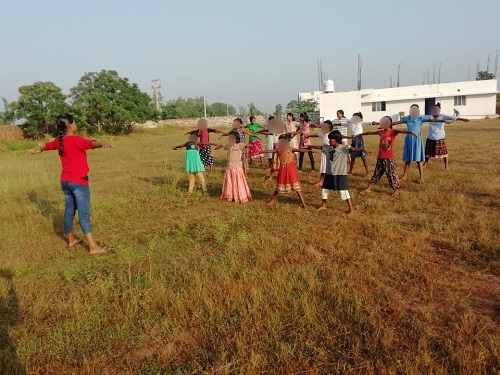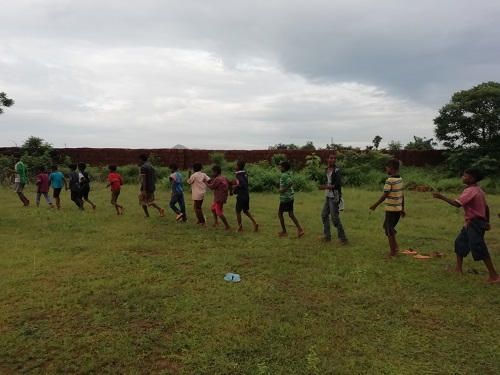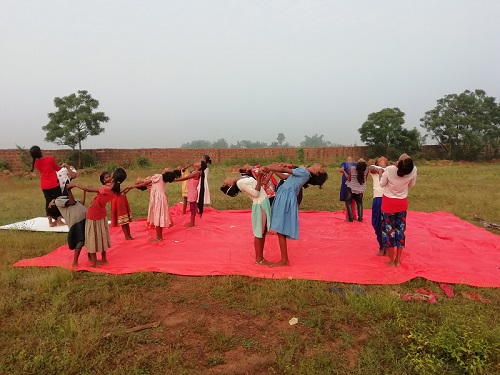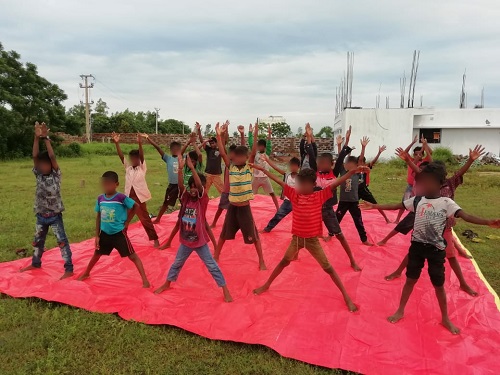SOCH as an organization has carried out a number of welfare activities for promoting volunteering for needy children & has been organizing campaigns for the development of children. It has created a platform for behavioral modification of children. Children who are being forced or within their own wish go into the dark world of substance abuse, children who are having limited access to basic health & education services & children who require serious environmental development change for their well being. All the things mentioned above makes a child fit for becoming a beneficiary of “PROGRAMME PUNARJIVAN”. The word “PUNARJIVAN” means “REBIRTH” it basically focuses on equipping them with all the tools and information that they need to help themselves to live a better life. This programme was started in the year of 2016 .This second life after the rebirth process of the camp is also supported by follow ups from SOCH and need based support is also provided on priority to the camp returned children.
We have realised that some of the children from the rakshak program are addicted to substance abuse & there is no point in sending them back to home because they are most likely to run away again. So, in order to change the children’s behaviours and de-addict them from various substance abuse, then we plan to put them into a residential rehabilitation program & that is what Program Punarjivan was started. Under this programme, we are operating a behavioral transformation with a very conceptualized and a proper time table.
Pursuing our diagram, we oversee several camps depending upon the condition of the child we want to a solicitor. We organize a 21 days camp for the children who are connected to their parents as if whenever we collect any sort of discrepancy in their attitude and way of reasoning, we can operate upon them. Then we have some children who are completely unaware of their parents, are not even having any idea about their location of residence & wandering around streets, railway platforms etc. For such kinds of children, we run a 28 days camp under which we analyze their behavioral crises and try to rehabilitate them from any sort of substance abuse. After the end of the campaign, we try to reunite the kids with their respective families or refer to institutional care.
But then the problem of their studies comes in between as we leave them just with the modifications in their behavior then they will not be able to study properly. So to bridge the gap between their age and standards of study we thought of Education bridge camp.
So under the Punarjivan Program we completely focus on the behavioral mutation by de-addicting them from harmful substances followed by their educational development.
- To change hard behavior and help families connect children to de-addicts from harmful substance abuse.
- To change the hard behavior, deaddict from substance abuse and reunite street children with their parents.
- To bridge the education gap between age and standard of study.
- Our team first specifies its intervention areas and supervises its meetings with key members like the community president, secretary, nearest school teachers, parents, and children as well. The team tries to comprehend the main purpose or motive of the strategy and then enrolled children for the camp. Around this duration, the team solicits selected children and parents as well as why they have to leave the havoc entity and the implication of pedagogy. With the assistance of CWC, Police, and others we try to realize children from the freeway and extricate them and then we advocate for them also. After a lot of counseling procedures of children and parents as well, the parents fill an authorization form where they mention that they are delivering their child to SOCH’s behaviour change camp for a specific duration.
The team carries the children to our camp followed by the starting of the process and operation.
| Target Category of Children | Type of Residential Camp |
| Children who lived with families who run away repeatedly, are addicted to substance and showed difficult behavior. | 3 weeks Residential Camp |
| Children who lived on the streets (but now placed in institutional care) who who run away repeatedly, are addicted to substance and showed difficult behavior. | 4 weeks Residential Camp |
| Children who dropped out from school for long time and not having issues with addiction or other behavioural problems. | 12 weeks Residential Educational-Bridge Camp |
3 Weeks Camp for Family Connected Hard Behavior Children.
4 Weeks Camp for Street Connected Hard behavior children.
12 weeks Education bridge Camp for school dropout children.
This camp is organized for children who run away from home due to certain treble reasons, children who are involved in substance abuse, Children who are irregular to school and Children with violent behaviors. Low income urban communities are areas of broad mental disadvantages to Children due to the atmosphere they live in. Child starts showing hard behavior towards everyone surrounding him which automatically results in Children running away from home, explosive temper tantrums can be seen. So, we deal with such kinds of Children and their aggressive nature in this 21 days camp. We organize a number of activities which includes Morning Prayer, evening prayer and yoga classes to calm their mind and one on one counseling sessions with the child which is being handled by our counseling team. Behavioral observations are being noted everyday and the changes that we receive are kept for further evaluation. Every day we engage as well as motivate everyone for physical activities like jogging and yoga because physical activities play a major role in countering aggression. If we are unable to cope up with their behavior, we even call child psychologists and arrange one on one session. We organize effective parents counseling too to figure out the exact problem of the child as somewhere parents are too responsible for their child’s behavior. After 21 days when our camp gets over, we still follow up to the child and we try to figure out the exact problem behind the child’s trauma. We perform parents counseling at their homes too after our camp to find out the solution as well as to find the improvement in the behavior. If the family is not capable of providing their child proper education, we arrange that for the kid by contacting residential schools. So, these are the things which we do after our camp gets over.
This camp is too organized for the same type of children as mentioned in the 3 weeks camp scenario except for the fact that all the children in this camp are street connected. They all are having long periods separated from family . We take these children from streets as well as from railway stations for our 4 weeks camp. We organize the same activities as we did in 3 weeks camp in the same chronological order but we have all the children for one extra week with us so that the team can be involved more as these children are rescued from streets, platforms etc. We take help from the child only if they remember any kind of landmark so that we can find his home address. If we are unable to find any child’s original address, with the help of Child Welfare Committee (CWC) we nourish the child and all the decisions regarding the child are taken by CWC accordingly.
This camp is organized for children who are committed as well as motivated towards studies, Because of poor financial condition of their parents; they are not able to gain proper education as per their current age. These children are neither indisciplined nor addicted towards any kind of substance abuse & they are very well behaved as well. We take these types of children for & make them strive hard for focusing on study & learning. We have planned to invite government teachers as well as students, volunteers who are expert in tackling such types of students. We will make them learn all those things which they start their proper education journey in the month of April, they don’t lack in any aspect. Like we take students of 12 yrs old, as a child has to be in class 5th or 6th as per normal educational perspective. So this is how we try to bridge the gap between them & their education as per their age.
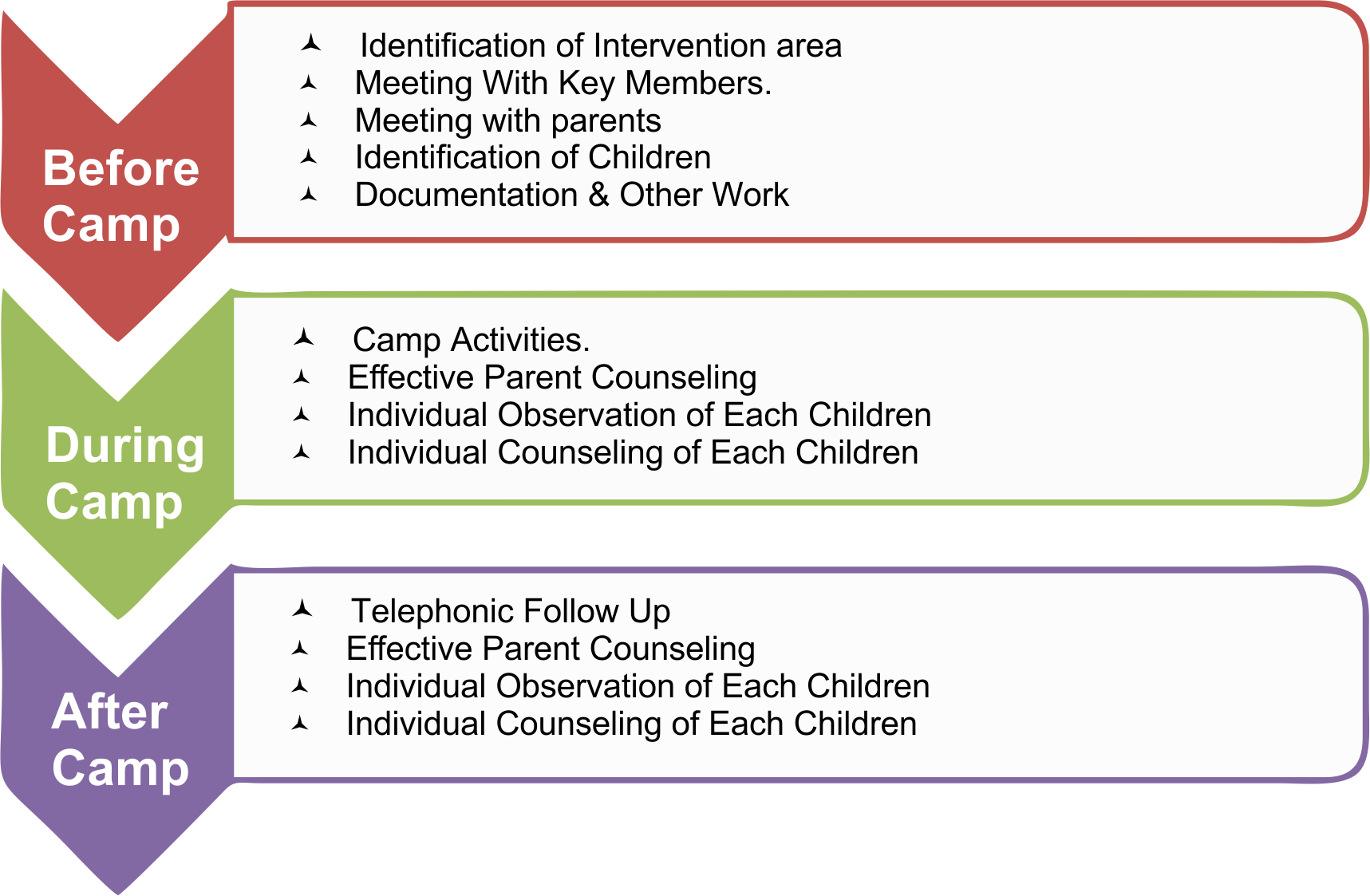
Camp Schedule for children’s activities:
| Time | 3 Weeks Camp/4 Weeks Camp | 12 Weeks Camp |
| 6:00 AM – 06:30 AM | Wake up-Drink Water-Fresh up | |
| 06:30 AM – 7:00 AM | Walking-Jogging | |
| 07:00 AM – 7:15 AM | Physical Training | |
| 07:15 AM – 07:45 AM | Brushing & eating biscuits | |
| 07:45 AM – 8:00 AM | Morning prayer & national anthem | |
| 08:00 AM – 8:15 AM | Yoga | |
| 08:15 AM – 09:15 AM | Bathing | |
| 09:15 AM – 10:00 AM | Breakfast | |
| 10:00 AM – 11:15 AM | De-addiction Session | Mathematics class |
| 11:15 AM – 11:30 AM | Break | |
| 11:30 AM – 01:00 PM | De-addiction Session | Mathematics class |
| 01:00 PM – 02:00 PM | Lunch Break | |
| 02:00 PM – 04:00 PM | Rest | Odia Class |
| 04:00 PM – 05:30 PM | Outdoor Game | |
| 05:30 PM – 6:00 PM | Washing Hands and feet | |
| 06:00 PM – 06:10 PM | Evening Prayer | |
| 06:10 PM – 06:30 PM | Jyoti Programme | |
| 06:30 PM – 7:00 PM | Evening Snacks & Extra Time | |
| 07:00 PM – 7:30 PM | Moral Story Telling Class/Child Counseling | English Class |
| 07:30 PM – 09:00 PM | Movie Screening | English Class |
| 9:00 PM – 10:00 PM | Dinner | |
| 10:00 PM -10:30 PM | Movie Screening | Rest |
Camp activities are very structurally designed. It is based on a very successful model worked out by SATHI (a National Level NGO) working on a similar theme as SOCH. Supervised by One Camp teacher and assisted by three to four assistants there is an activity packed day schedule running continuously for a Particular time period. Counseling being the primary activity, Physical Exercise, Yoga, Meditation, Moral Story Classes, Non-formal Education, Games, Children Meeting, Jyoti Programme, etc. would be among other activities aiming at inducing discipline among these children who had displayed hard behavior. Breakfast, lunch, evening snacks and dinner; apart from providing nutrition, the camp also aims at inculcating the values of community living among them. Apart from healthy food for better physical health, the children in camp would share a great bond and friendships during these meals.
As they say it “healthy body, healthy mind”. The physical health and mental health of a child go hand in hand. Therefore, the children in the camp compulsorily take part in physical exercise on a daily basis under the supervision of the Camp Teacher and assistants.
 Yoga and meditation has been acclaimed worldwide as a mode to bring focus in life keeping it away from all malicious thoughts. They also help in cure of many mental and physical ailments. It brings an unprecedented calmness into us and enhances our acceptance. Hence it is a 30mins daily session aimed at the holistic well-being and development of the Camp children.
Yoga and meditation has been acclaimed worldwide as a mode to bring focus in life keeping it away from all malicious thoughts. They also help in cure of many mental and physical ailments. It brings an unprecedented calmness into us and enhances our acceptance. Hence it is a 30mins daily session aimed at the holistic well-being and development of the Camp children.
These are the basic education classes for the Camp children where they are taught to identify English alphabets, birds and animals. Special efforts are made to manage the classes where children from different backgrounds could be absorbed.
SOCH invited 8 Resource Persons on various days. Among them were Psychologist, who counseled the children and showed them a new approach towards life; a Yoga teacher has also joined and conducted Yoga class for the children. There were 5 life skill trainers, who had taken special class and taught the students various skills through games and other activities. We were fortunate to have JOY from London who taught Basic English to the children.
- De-Addiction Class: A special class on de-addiction was taken by Md. Imran Ali (a renowned social worker in the field) for the de- addiction of the children. He garnered the session with some videos and documentary films on the harm consequences of substance abuse.
- Moral Story class: Moral Story classes are scheduled to induce certain values in the children through story telling sessions. The stories are related to four important domains. Each story domain is for one week time to be told to the children, discussed among them and to counsel him on the aspects that might have led to emotional distress among them. The four domains are
- Games(Outdoor/Indoor): Along with various programs, there would be one hour for their leisure when the children would be allowed to play various indoor as well as outdoor games for entertainment. Along with leisure, the games are a great source of relaxation and incorporating friendliness among the children.
- Drawing classes and competition: To enhance the artistic potentiality within the children the Camp team conducted drawing and painting sessions. And to motivate them further a competition was also organized that was rewarded with some prizes.
- Campus cleaning and environmental awareness: Good environment is not only needed for good physical health but also for complete growth and development it’s a basic need. Human beings themselves can create a good healthy environment. Within the camp period, the Camp team organized campus cleaning programmes inside AVA campus premises. The main objective behind this was to create environmental awareness within the children and to aware them about the need for a good healthy environment.
- Children Meeting: This would be an activity where the Children would be given free hand to talk about themselves and their grievances in the Camp. Simultaneously helping the children to assert themselves as a distinguished part of the camp where they can talk about their needs. More than everything this acts as a review and feedback mechanism.
- JYOTI Programme: The JYOTI programme is incorporated as a value imparting program where a candle is placed in front of the children and they vow to give up one of the many inherent vices every day. Discussions regarding a better future without lies, obedience, regarding and respecting elders and parents will be adopted. At the end of the program, the children pledge to implement the discussed positive value in their life.
Special attention is given to children’s health in the first week of the camp. Medication as per their requirement is imparted to all the children. Moreover, a special time for medication is allotted so as to build consciousness among the children regarding their own health.
A daily dose of counseling helps the camp children to relax as they are already in stress for the Camp in its initial phase acting as a bondage to them. They all had a habit and free will of roaming around. Confining them within a boundary would definitely show some resistance. Counseling sessions eases off such stress. Further it brings about clarity about the past events of the child’s life that again can help in address tracing. Counseling helps in designing child specific approaches for their modification. Hence frequent child counseling by professional counselors are scheduled.
As it is expected from the Camp children to realize their mistakes and work toward rectification, similarly parents need to work effectively on their understanding and liberalization of the aspirations of their children. They need to sensibly deal with the critical issues. Hence to help them have a better understanding of effective parenting a Workshop is conducted for the parents, traced and identified before handing over their children to them.
Our camp children had visited IIT, Arugul campus & participated in dance competition, song competition, drawing competition & rangoli competition organised by students of IIT. Children got participation certificates for each activity & water bottle, geometry boxes were distributed to children at last.
Post the “Effective Parenting Workshop” a Camp Ending Ceremony is organized to celebrate Home going for family connected children or the reunion of the separated children with their traced families, in presence of the Govt. Authorities, CWC Members, supporters and other guests.
The modification doesn’t end with family reunion or referral to other institutes only, rather it extends to follow-up. A telephonic follow up is done after one- month and then a subsequent follow-up after three. months of reuniting the child with the family is done. In some cases, a physical follow-up visit is done to establish the reliability of the telephonic follow-up information.
| Sl. No. | Duration | Category | Gender | No. of Children Enrolled | No. of children reunited with Family | Institutional care | |
| CCI | Open Shelter | ||||||
| 01 | Feb – 2016 | 4 weeks | Boys | 20 | 11 | 03 | 06 |
| 02 | Mar – 2018 | 3 weeks | Boys | 17 | 12 | 05 | 00 |
| 03 | Sept – 2019 | 3 weeks | Boy | 20 | 20 | 00 | 00 |
| 04 | Nov – 2019 | 3 weeks | Girls | 20 | 20 | 00 | 00 |
| 05 | Jan- Feb – 2020 | 3 weeks | Boys | 21 | 21 | 00 | 00 |
| 06 | Jan – Apr -2021 | 12 weeks | Boys | 17 | 17 | 00 | 00 |
| Total | 115 | 101 | 08 | 06 | |||

